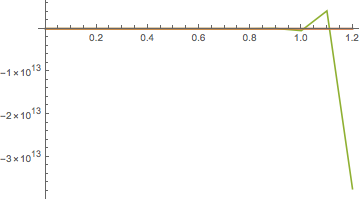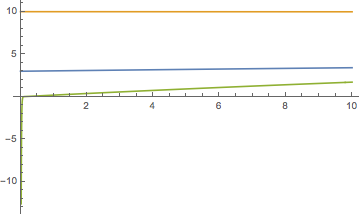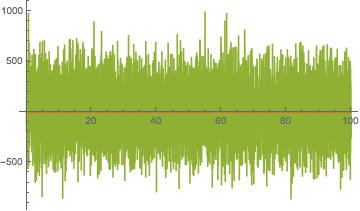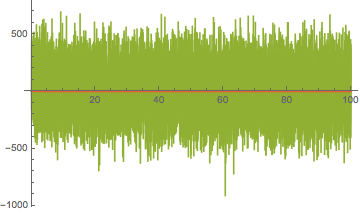I have the stochastic system which consists of 4 nonlinear equations. White Gaussian noise is used in the third equation only. Nevertheless, the whole system is stochastic.
Some problems arise when I try to compute random trajectories:
General::nomem: The current computation was aborted because there was insufficient memory available to complete the computation.
Throw::sysexc: Uncaught SystemException returned to top level. Can be caught with Catch[…, _SystemException].
There is plenty of free memory, but for some reasons MATHEMATICA considers my system as an uncomputable one. Is there a way to overcome it? here is my code:
(*parameters*)
ρ = 0.2; νmax = 100; Vth = 25; kV = 20; gKLeakOvergl = 0.5; \
GsynOvergl = 5; Kbath = 8.5; τK = 100; γ = 10; δK \
= 0.02; τNa = 20; δNa = 0.03; τm = 0.01; τD = \
2; σOvergl = 25; δxD = 0.01;
(*additional functions*)
Ipump[K_, Na_] = ρ/((1 + Exp[3.5 - K]) (1 + Exp[(25 - Na)/3]));
f[x_?NumericQ] =
Dot @@ MapAt[Boole,
Internal`FromPiecewise[Piecewise[{{0, x < 0}, {x, x >= 0}}]], 1];
ν[V_] := νmax f[2/(1 + Exp[-2 (V - Vth)/kV]) - 1];
Vk[K_] = 26.6 Log[K/130];
uOvergL[K_, V_, xD_] =
gKLeakOvergl (Vk[K] - Vk[K0]) + GsynOvergl ν[V] (xD - 0.5);
(*initial conditions*)
K0 = 3; Na0 = 10; V0 = Vk[K0]; xD0 = 1;
(*differential equations*)
rhs1[K_, Na_, V_, xD_] := (Kbath - K)/τK -
2 γ Ipump[K, Na] + δK ν[V];
rhs2[K_, Na_, V_, xD_] := (Na0 - Na)/τNa -
3 Ipump[K, Na] + δNa ν[V];
rhs3[K_, Na_, V_, xD_] := (-V + uOvergL[K, V, xD])/τm;
rhs4[K_, Na_, V_, xD_] := (1 - xD)/τD - δxD xD ν[V];
proc = ItoProcess[{\[DifferentialD]K[t] ==
rhs1[K[t], Na[t], V[t],
xD[t]] \[DifferentialD]t, \[DifferentialD]Na[t] ==
rhs2[K[t], Na[t], V[t],
xD[t]] \[DifferentialD]t, \[DifferentialD]V[t] ==
rhs3[K[t], Na[t], V[t],
xD[t]] \[DifferentialD]t + σOvergl/τm \
\[DifferentialD]w[t], \[DifferentialD]xD[t] ==
rhs4[K[t], Na[t], V[t], xD[t]] \[DifferentialD]t}, {K[t], Na[t],
V[t], xD[t]}, {{K, Na, V, xD}, {K0, Na0, V0, xD0}},
t, {w \[Distributed] WienerProcess[]}]
solproc =
RandomFunction[proc, {0., 100., 0.1}, Method -> "EulerMaruyama"];




